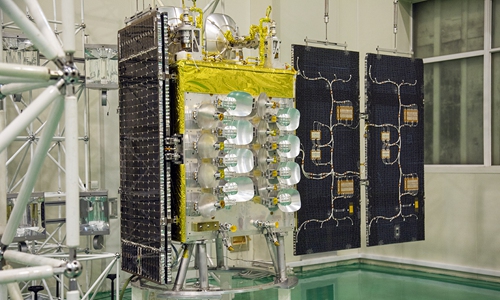HOME >> SOURCE
Venture capital dreams of investing in China’s private satellite launches
By Li Xuanmin and Zhang Hongpei Source:Global Times Published: 2019/12/25 21:43:43

Chinese rocket firm iSpace's carrier rocket successfully sends satellites in orbit on July 25 from the Jiuquan Satellite Launch Center. Photo: Courtesy of iSpace
Could China's private companies dream of soaring into space? Yes, of course - with the support of venture capital (VC) investors.
This year saw boom times for China's private space start-ups, with at least three landmark rocket orbital launches, flexing muscles to the world on how China could rival the US commercial space industry despite a late start. The spectacular rise has been partly buoyed by large amounts of investment from VC firms, which even in 2017 had their eyes on the potentially lucrative businesses.
"Most Chinese start-ups saw their capital pool dry up this year. The commercial space industry is one of the exceptions. It remains the crown jewel of investment despite a dismal financing environment" due to the technological barrier, a spokesperson from Shunwei Capital told the Global Times.
The breakthrough orbital launch of Chinese private-sector rocket company iSpace in July this year bolstered VC confidence in further investing in the area. Prior to the launch, the market sentiment was dim, a VC senior executive told the Global Times.
The company invested in iSpace in early 2018.
In most industry observers' eyes, the stakes of investing in the private space industry are very high: It is a rapidly growing business that requires great input and imposes long payback periods. It is also a "banknote printing machine in the sky," as one expert described it.
"Investors have come to know that investing in the commercial space sector cannot generate huge returns as quickly as they desire. They have become more rational and patient," said the senior executive.
In the past two years, resources including talent and capital have been clustering around leading start-ups in the market, according to the executive.
"Some leading rocket firms may able to make a small profit next year. For satellite firms, it could take longer," a Shunwei spokesperson said.
She added that launch fees charged by China's rocket companies for normal-sized satellites total about 15 million yuan, and most start-ups plan to have such launches two to three times next year.

A view of low-Earth 5G broadband satellite made by Galaxy Space in December. Photo: Courtesy of Galaxy Space
The Beijing-based VC has invested in four private space companies that specialize in different technological roadmaps, including iSpace and Galaxy Space.
It was estimated that in 2018, China's private space industry received funds totaling 3.6 billion yuan, compared with 2.16 billion yuan in 2017, according to industry insiders. The fundraising amount will be higher in 2019.
An industry insider surnamed Chen told the Global Times that some private start-ups also plan to launch IPOs on China's science and technology board to attract more investment. "As most Chinese start-ups are in the early stage of doing R&D, they'll be hungry for funds for a long time."
But Chen said that the industry has an unwritten rule: It only allows yuan-denominated investments. "Dollar-denominated investment from US funders is prohibited."
Despite being a latecomer, Chinese VCs believe that the gap between Chinese and US private space companies is repidly closing. Currently, the US rocket start-up SpaceX is valued at $33.3 billion, while China's Galaxy Space's valuation stood at 5 billion yuan, one of the highest among Chinese start-ups.
Shunwei spokesperson said that China's soaring demand will eventually give birth to a private space start-up that is valued upward of $10 billion, rivaling early starters.
RELATED ARTICLES:
Posted in: INDUSTRIES,BIZ FOCUS